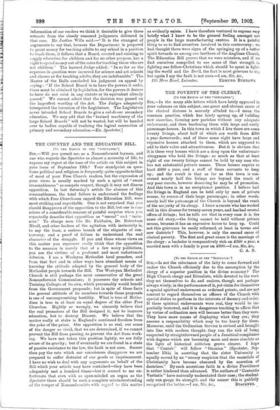THE COUNTRY AND THE EDUCATION BILL.
[TO THE EDITOR 01, THE "SPECTATOR."] SIR,—Will you permit me, as a Nonconformist layman, and one who regards the Spectator as almost a necessity of life, to express my regret at the tone of the article on this subject in your issue of September 13th ? Your standpoint on ques- tions political and religious is frequently quite opposite to that of most of your Free Church readers, but the expression of your views is usually marked by such a spirit of " sweet reasonableness " as compels respect, though it may not disarm opposition. In last Saturday's article the absence of this reasonableness, the total failure to understand the feelings with which Free Churchmen regard the Education Bill, were most striking and regrettable. One is not surprised that you should disapprove of the opposition to the Bill, but one is con- scious of a considerable amount of painful surprise when you repeatedly describe that opposition as "unreal" and insin- cere." To charge men like Dr. Fairbairn, Dr. Robertson Nicoll, and other leaders of the agitation with insincerity is, to say the least, a serious breach of the etiquette of con- troversy, and a proof of failure to understand the real character of the struggle. If you and those whose views on this matter you represent really think that the opposition to the measure is merely that of a few noisy politicians, you are the victims of a. profound and most unfortunate delusion. I am a Wesleyan Methodist local preacher, and from that fact and in other ways have abundant means of knowing the attitude adopted by the general body of the Methodist people towards the Bill. The Wesleyan Methodist Church is still perhaps the most conservative of the great Nonconformist Communions; it possesses day schools and Training Colleges of its own, which presumably would benefit from the Government proposals; but in spite of these facts the general attitude of its members towards those proposals is one of uncompromising hostility. What is true of Metho- dism is true in at least an equal degree of the other Free Churches. Rightly or wrongly, we sincerely believe that the real promoters of the Bill designed it, not to improve education, but to destroy Dissent. We believe that the matter really at stake is England's continued freedom from the yoke of the priest. Our opposition is so real, our sense of the danger so vivid, that we are determined, if we cannot prevent the Bill from passing, to prevent the Act from work- ing. We have not taken this position lightly, we are fully aware of its gravity; but if eventually we are found in a state of passive resistance to the law, the fault is not ours. Sooner than pay the rate which our consciences disapprove we are prepared to suffer distraint of our goods or imprisonment. I have no wish to deal with any arguments on behalf of the Bill which your article may have contained—they have been adequately met a hundred times—but it seemed to me un- fortunate that even with so open-minded an organ as the Spectator there should be such a complete misunderstanding of the temper of Nonconformists with regard to this matter as evidently exists. I have therefore ventured to express very briefly what I know to be the general feeling amongst our people in the large manufacturing centres. It is a painful thing to us to find ourselves involved in this controversy; we had thought there were signs of the springing up of a better spirit towards us among our brethren of the Anglican Church. The Education Bill proves that we were mistaken, and if we find ourselves compelled to use some of that strength in fighting our fellow-Christians which should be spent in fight. ing the world and the Devil, the fact is most grievous to us ; but again I say the fault is not ours.—I am, Sir, &c.,






































 Previous page
Previous page